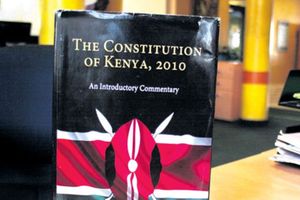
President William Ruto addresses members of the public during commissioning of Nandi Hills Water Treatment Plant in Nandi Hills Constituency, Nandi County on August 17, 2024.
President William Ruto just doesn’t get it. He bought himself reprieve from the Gen Z revolt by bringing opposition leader Raila Odinga’s troops to the feeding trough, but instead of fixing the things that need fixing, he is back to factory settings.
As he pops out of the sunroof of his limousine to address crowds with stump campaign pitches that have never progressed beyond the usual election promises, it becomes clear that President Ruto just does not understand he is sitting on a time bomb. He doesn’t see that he purchased only a narrow window of opportunity during which he must roll up his sleeves and urgently address the critical failings that have made his administration wildly unpopular.
The President deludes himself in thinking that simply admitting Mr Odinga’s nominees into the reconstituted Cabinet is the answer to the issues that sparked an unprecedented popular revolt. Transactional politics won him some breathing space, but the anger is still there, boiling below the surface.
The issues are punitive taxation, unemployment, corruption and cost of living. There is also anger over public displays of opulence, primitive accumulation of wealth and the arrogance of power from those in the presidential entourage.
Real concerns
Instead of working hard to address those very real concerns, the President is adding fuel to the looming inferno. Those premature campaign tours illustrate perfectly everything that has worked to dent President Ruto’s image. The massive entourages show the contemptuous attitude to demands for change. The President suffers negative perceptions aptly captured by the title of the hit 1993 album by British reggae band UB40, Promises and Lies.
Much of the youthful fury that almost ground the country to a halt towards the end of June was sparked by the President Ruto’s penchant for extravagant campaign promises that never see the light of day.
Today with every borehole, electricity connection or other mundane project he re-opens or re-launches for the umpteenth time, or every pledge to splurge billions on this or that development initiative, he is only adding to the negative narratives.
He is deaf and dumb to the muted hostilities evident, paying attention only to the mercantile praise singers accompanying his campaign tours.
It is clear that to the President, the Gen Z revolt was only a minor bleep. Instead of major structural reforms, he actually wants to bring back more or less the very same offensive taxation proposals in the Finance Bill he was forced to withdraw due to public anger.
He just doesn’t understand. He seems to imagine that the lifeline offered by Mr Odinga was licence to go back to business as usual, a leadership that is concerned only with the hold on political power to the exclusion of everything else.
It is evident that instead of fixing the economy, President Ruto’s only obsession is regaining lost political ground ahead of the 2027 elections. He seems not to make the connection between re-election prospects and the state of the economy.
Finance Bill
The President admitted early on in the Gen Z revolt that one problem around the Finance Bill was communication failures. Yes, it is true that his administration has performed dismally in messaging and in projecting a positive image despite having probably more fellows in the communications dockets than all past governments put together. But failed PR was not the main problem with the Finance Bill as State House and the new bosses at the National Treasury seem to believe.
Neither was the problem caused by phantom political foes or foreign saboteurs. The problem was a Finance Bill that cannot be fixed with a little tinkering, presumed control of the political equation, or pointing the finger of blame at external meddlers.
The Gen Z rumblings may have been temporarily muted, but they are simmering just below the surface. They will erupt with an even greater force than the last time around.
***
Obituary-writing has never been our strong point. We usually limit ourselves to the tired “he was born, baptised, started school, married, got children, fell ill and died” template. However, a eulogy read last Friday at the funeral service of one Martin Karanja illustrated that the art is not dead. Excerpt:
“Being of adventurous spirit, great planning wasn’t part of his MO. He didn't fret over the future, he didn’t waste time procrastinating, he did what he wanted, when he wanted, which of course meant he was entirely unemployable. When he wanted to consider a matter he’d say ‘let me sleep over it’ then quickly chase that thought down with a few glasses of something chosen for its strength”. Brilliant.
[email protected]; @MachariaGaitho













